Prince Vladimir against bogatyrs. Intrigues and scandals of the princely court of the epic Kiev
Prince Vladimir
Prince Vladimir is almost always present in epics, but invariably as a minor or even episodic character. And we see him exclusively at a feast, even if Kiev is besieged or captured by enemies. The character of Vladimir in Russian epics changes according to the requirements of the plot. The story-tellers for some reason did not consider it necessary to invent an antipode to this, in general, a positive character — some conditional Svyatopolk or Izyaslav. That is, Russian epics have their own “King Arthur”, but there is no “Mordred”. If you need a prince just and affectionate - please, here Vladimir feasts, surrounded by boyars and warriors, without denying hospitality even to a stranger.
A jealous and mercenary man is needed - as such, Vladimir appears in the epics about Duke Stepanovich and Stavre Godinovich (Gordyatinovich).
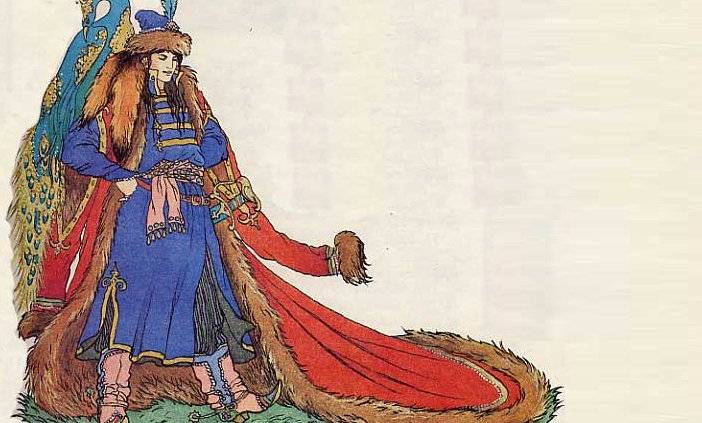
It is required to illustrate the collaborationism of the ruler, who betrays the interests of the people, giving the state to the power of foreign invaders - read the epics about Tugarin Zmeyevich and Idol Pogan: the conquerors have a feast at the table in every possible way pleasing and serving them a prince (who tolerates even the “guest” with the wife and the prince cheering Apraksoy).
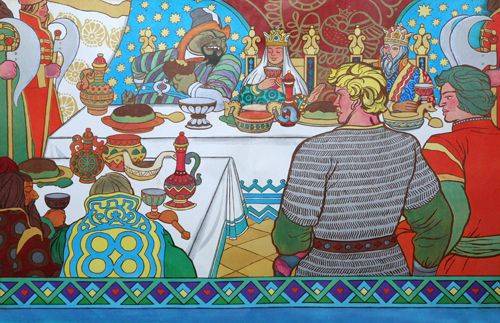
Voluptuousness and deceit ascribes to Prince Vladimir the epic about Danil Lovchanin. Treachery and ingratitude we see in the epics about his quarrel with Ilya of Murom.
As a result, the image of the epic prince turned out very ambiguous.
Opinions of historians
Medieval historian and researcher of Russian folklore A.V. Markov suggested that the epic were previously divided into "heroic" and "princely." For princely epics, in his opinion, was characterized by the idealization of the image of Vladimir. And in the heroic epics could appear hostility and even antagonism between the indivisible warriors and the aristocratic environment of the prince.
So, the epic Prince Vladimir, who is traditionally revered by the embodiment of popular ideas about the ideal prince - the defender of his native land, has its dark sides.
Famous Russian ethnographer V.F. Miller wrote:
Such a duality in the characteristics of Prince V. Miller was explained by Eastern influence on the Russian epic:
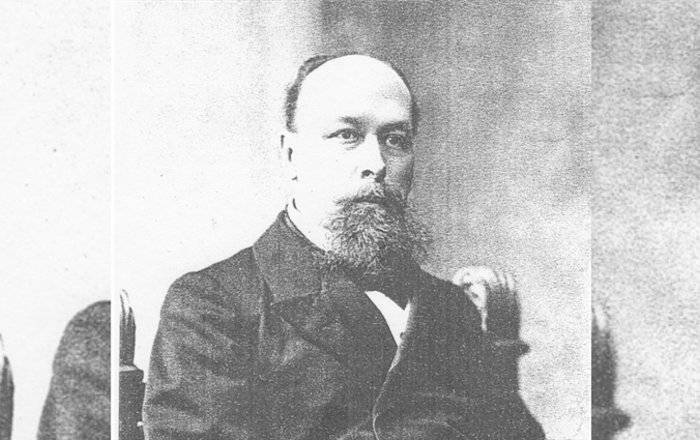
But his namesake, Orest Miller, professor of the history of Russian literature (Ostsee German and Slavophile) considered some of the negative features of the epic Vladimir as an echo of the “German squad in Vladimir as a Varangian prince”. From here, in his opinion, comes the greed of this prince. It is impossible to agree with this argument, since stinginess was considered by the Normans as one of the most terrible shortcomings of any king. It was because of her that Yaritsleiv from Holmgard (Yaroslav the Wise) did not become the ideal hero of the sagas: all Scandinavian authors noted that the king was a good ruler, but stingy, and this sounded almost like a sentence. The Normans of the Viking Age believed that every free man should own only what he got himself. Everything that the father did not give his sons as a reward for their deeds should have gone with him to the grave. At the same time, it was not forbidden to excavate the mounds, but weapon even specially wrapped in oiled cloth - so that the hero, who was not afraid of the rage of the grave inhabitant, could extract it. Memories of such searches formed the basis of Russian fairy tales about swords-kladentsah (that is, from the treasure).
A. Nikitin wrote:
Another philologist and historian of literature, F. Buslaev (XIX century), drawing attention to the “dullness and colorlessness” of the epic Vladimir, considered the reason for this is the people’s preservation of the Varangian origins of the Kiev princes, their alienity for the majority of the Russian population:
The same author believed that the epic epic is a reflection of pre-Christian Russia, and Vladimir, in his opinion, only from later story-tellers acquires some superficial traits of the Christian sovereign.
Now consider the epics, in which Vladimir is not so "bright" and not at all affectionate "Sunshine".
Prince Vladimir and Ilya Muromets
The most famous of them is “Ilya of Murom in a quarrel with Prince Vladimir.” This epic is often wrongly combined or confused with another song called “Ilya and Goliy Kabatsky”, in which Vladimir did not call the aged Muromets to his feast. There are two versions of this epic. In the first, Ilya himself went to the princely feast, but he left, being unhappy with the place offered to him. In the second, the offended Illya does not even enter the princely terem. In both cases, he knocks down the golden poppies of the Kiev churches with arrows and, with the money raised, arranges his own feast, to which he invites all the poor, and then leaves Kiev.
In the epic, “Ilya Muromets in a quarrel with Prince Vladimir,” the hero's conflict with the prince is much more profound and has very serious consequences. In the text of this epic, the guests are divided into two categories: the boyars and merchants, at the table, boasting “silver, gold, pearls, treasury”, and heroes, “Svyatorussky soldiers”, who have nothing to boast about in this regard. This is followed by the traditional ritual of princely awards. Vladimir says guests:
Whom I will give pure silver,
Whom I will give red gold,
Whom do pitched pearls.
At the same time, he generously presents it to the boyars, literally crumbs of the bogatyrs, and Vladimir forgets about Illya at all. The situation is so scandalous that even the prince’s wife, Apraksa (or Eupraxia), intervenes and reminds her husband of the bogatyr. Vladimir replies:
I will present I removed the good fellow
Those gifts that came to me
From Tatar from Busurmanov:
I will present him with a coat of sable.
It would seem that the situation was safely resolved, but, as they say later in the epic, "Ilya did not come in honor of a fur coat."
Firstly, it is a gift according to the residual principle, secondly, a Tatar fur coat, thirdly, in the Pechora version of the epic, Vladimir gives Ilya a fur coat, which was previously presented to the bogatyr Duny, and left unattended after his death, that is, the mute dress. On this basis, we can conclude that, in fact, Ilya Muromets doesn’t like Vladimir and his closest associates at all: in the princely terem of this bogatyr, despite all his merits, they are still considered “upstart” and “bushman”.
An additional reason for dissatisfaction with Ilya is that, again, he was not even called to this feast, and when he came himself, they put him at the end of the table - “with the boyars' children”. Some narrators are trying to mitigate the situation and explain this by the fact that Illya has been absent from Kiev for too long: when the bogatyr came to the prince, they simply did not recognize him. Favorite people and authoritative in military circles Ilya Muromets cannot sit down at such a place, and therefore he hides the name, calling himself "Nikita Zaleshanin, who came from behind the forest", that is, an ordinary warrior (in the epic article about the bogatyr outpost men who served on it Zalashanyi "). In protest, he allegedly accidentally breaks the barriers on the bench, and “presses the boyars and merchants sitting on the other end.
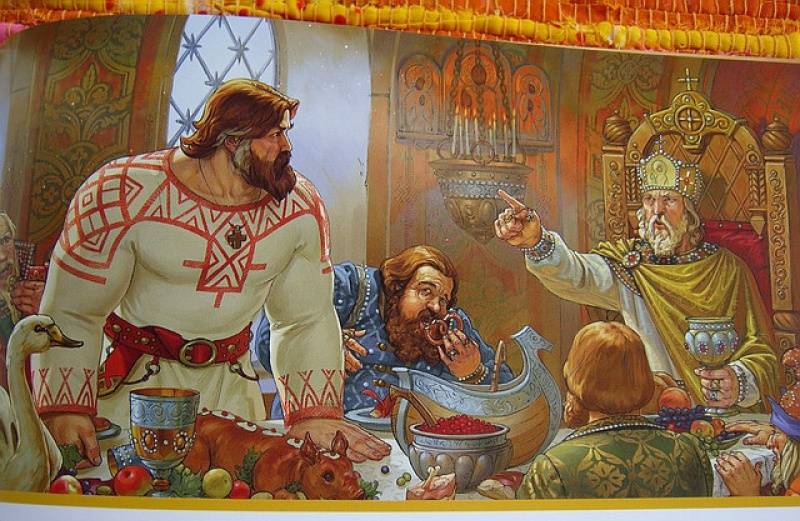
Seeing this, Vladimir “darkened like a dark night”, “got angry, as if the lion was a beast” and ordered to bring the ignorant person out into the street. But Elijah easily scatters vigilantes, and, only by demonstrating his strength, he leaves the princely chambers. Here are repeated the epic events about the “pubs of the pubs”: Ilya shoots at the golden poppies of the princely court and churches, and holds a feast with the poor. At the same time, he threatens Vladimir:
I will serve the prince in Kiev
And with me you will be the leaders.
And the “fur coat” donated by Vladimir he “drags on the ground” with the words that he will also carry the prince, tramples her with his feet, pours wine on him.
Vladimir already understands who came to his chambers. The higher is his fear: he orders to plant Ilya:
Do not give him either to drink or eat for exactly forty days,
Yes, let him die, the dog, and with hunger.
Zamevlyaevsya Ilya fraudulently lured into the cellar, which is closed with a grate and covered with sand. Outraged warriors led by Dobrynia leave Kiev, which now remains defenseless against the Tatar invasion. The rest is well known: Ilya did not die of hunger because the wife (or daughter) Vladimir ordered to bring the food to the cellar.
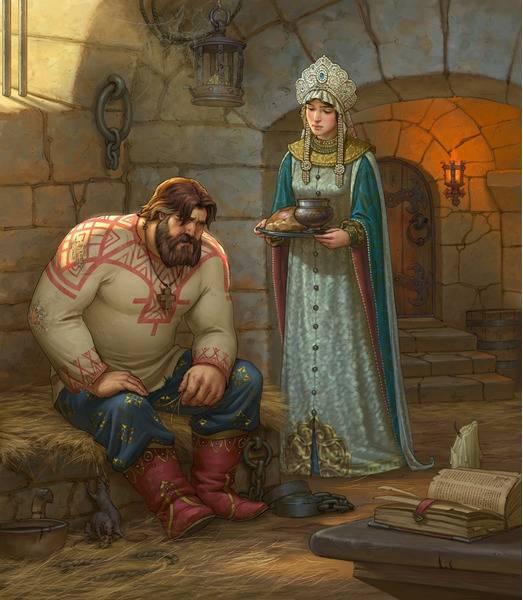
The bogatyr reconciled with Vladimir only when Kiev was almost taken by the Tatars who besieged him.
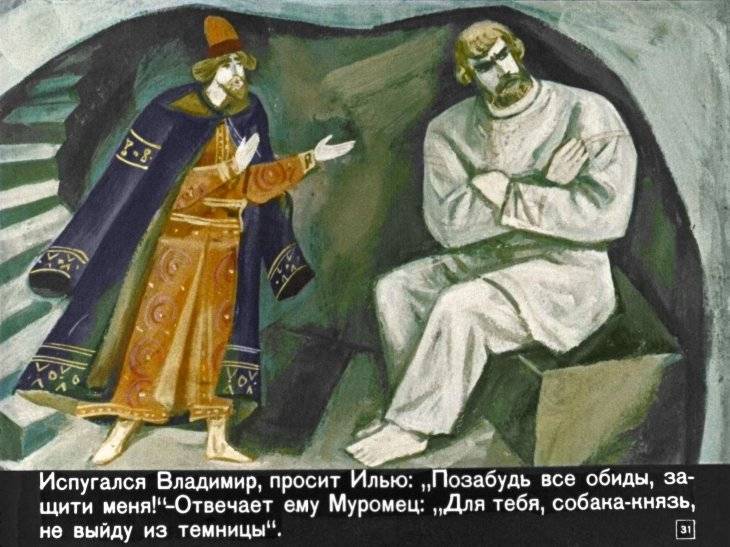
Sukhman-hero
Another epic, in which Prince Vladimir turns out to be a negative hero, is a song about the bogatyr Sukhman Odihmantevich (note that this bogatyr has the same patronymic name as the Nightingale the Robber).
Posted by the prince for a living swan, Sukhman encounters a Tatar army on the bank of the River Nepra and single-handedly smashes it.
But Vladimir does not believe him and, enraged by the non-observance of the order, he is imprisoned in the cellar. Slightly cooled down, he nevertheless sends Dobrynya to check the message of Sukhman. Convinced of the veracity of the story, he releases the hero, but he refuses to meet, rips off the bandages and dies from bleeding. According to legend, the river Sukhman was formed from his blood.
B.A. Rybakov believed that this hero was a representative of the tribe of "black hoods". Moreover, he considered the hero of the prince of the Torks Kuntuvdei to be the prototype, who was agreed by enemies of the Socialist Republic of Socialist Republic of Socialist Republic of Socialist Republic of Socialist Republic of St. Petersburg Social Security and Socialist Republic of Lithuania in 1190. Rybakov compared the leader of the Tatar army with a Social Security Council of Aztyak Tavrulievich.
However, in other variants, the patronymic of the hero is called Damantovich, which, according to some researchers, may indicate his Lithuanian origin (variants of Dovmontovich and even Gediminovich are assumed).
Some researchers drew attention to the similarity of the epic with the reports of the Nikon chronicle: in 1148, the governor Demyan Kudenevich defeated the allied forces under Yury Dolgoruky’s son Gleb and the Polovtsi allies under Pereyaslavl. The following year, Gleb again laid siege to Pereyaslavl, and Demian again emerged victorious, but received many wounds in battle, from which he died. Pereyaslavl Prince Mstislav Izyaslavovich tried to reward the dying commander, but received the answer: "There is no need for the dead to desire perishable gifts and passing power."
The tragic fate of Danila Lovchanin
Vladimir looks even more unattractive in a rather rare epic about Danilo Lovchanin (“Danilo the Lovchanin with his wife”). Some researchers have suggested that in this case, the image of Vladimir was superimposed with the features of Ivan the Terrible.
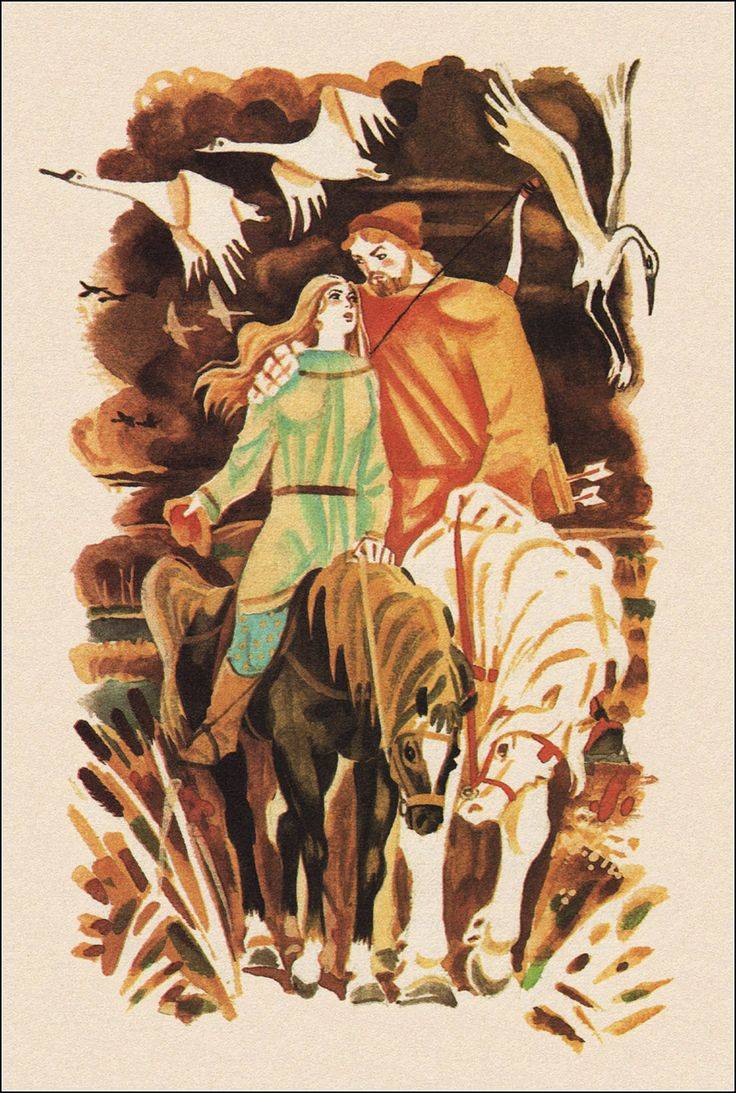
Danil's wife, Vasilisa Nikulichna, a certain toady in Mishatychka Putyatnitin (Putyatovic) recommended Prince Vladimir as a bride. To get rid of Danilo, they send him to get the “lion of the dead”. But this is only a pretext, not trusting the “lute” of a lion there, Vladimir sends his warriors, led by Daniil, led by the same Misatychka Putyatnitny. Outraged, Ilya Muromets is trying to sensate the prince (“you will wear a clear falcon, but you will not catch a white swan”), for which he (again!) Is put in a cellar. Danila fights with the warriors sent to kill him, and almost wins, but, seeing among them Nikita’s brother and the brother named, Dobrynya, he
Stupid end sticks the ground in the cheese,
And at the end of the he fell.
According to another version, Danilo ran out of arrows, and the weapon broke, and he was killed by a stab in the back, hidden in the bushes by Mishatychka.
Vasilisa, having learned about the idea of the prince, disguised in a man's dress, goes for Danila to warn him, but he is late. Vladimir, exhausted from impatience, leaves Kiev to intercept her and bring her back. Forced to go down the aisle, Vassilis hides a knife under the wedding dress, and kills herself on the way to the church. Ashamed Vladimir, lets out of the cellar Ilya of Murom and orders to execute Mischatyku.
Many researchers drew attention to some similarities in the plot of the epic with the events described in The Tale of the Ruin of Ryazan Batu in 1237: Eupraxia, the wife of Ryazan Prince Fedor Yuryevich, who died at the rate of Batyi after refusing to “show her beauty to the Khan, also committed suicide, rushed to the ground from the window of his tower. The historical prototype can also be Mishatychki Putyatin: the name was given by the thousand-handed prince of Svyatopolk Izyaslavich, whom the Kievites killed in 1113.
The literary merits of the epic about Danil Lovchanin were highly appreciated by many famous writers (among them L. Tolstoy, who, according to his wife, was going to write a drama on this plot) and critics. N.G.Chernyshevsky considered this epic "the best model in the folk poetry of the unity of form and content, their perfection".
"Female" epic "Stavr Godinovich"
Another epic, in which the Kiev Prince Vladimir looks not the best way - the famous song "Stavr Godinovich" (or Gordyatinovich). Currently over 80 records of this epic are known.
True, it should be said that in this epic not only Vladimir and his courtiers, but Stavr himself do not cause the slightest sympathy. This song can be called "epic without heroes" (masculine). The only positive character (heroine) is Stavr's wife, who is forced to act not on her own will, but because of the stupid bragging of her absurd husband.
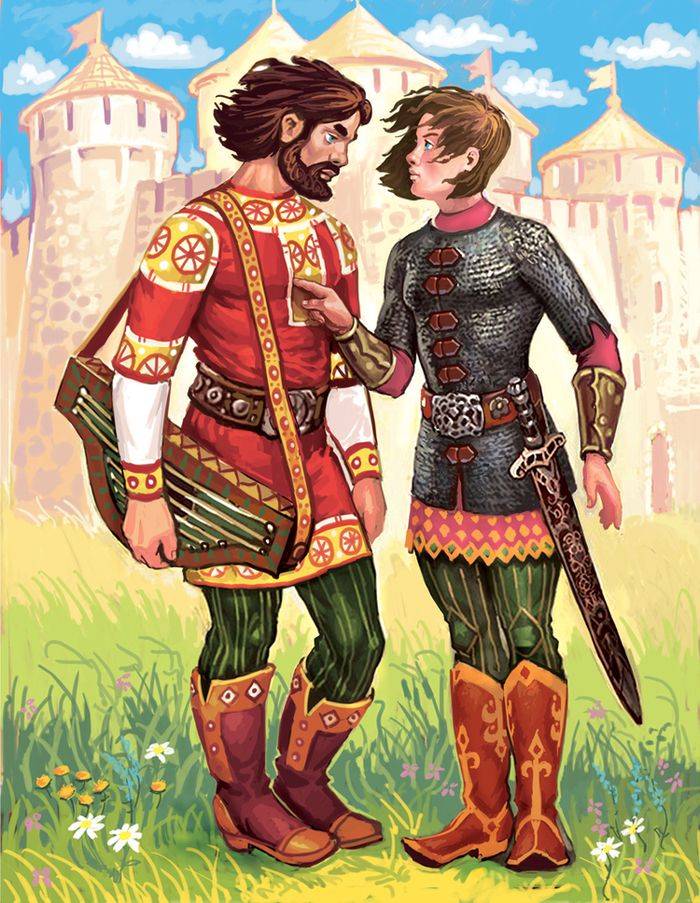
The epic description of the feast begins, at which the guests, and then Prince Vladimir himself, boast of their wealth - and, of course, no one dares to contradict the prince. But suddenly "he finds a scythe on a stone": apparently, Stavr, who is already pretty drunk, begins to challenge the primacy of the prince, while clearly provoking him. V.F. Miller wrote:
But this is not enough for Stavrou - he is also his wife, Vasilisa Mikulichnu, here he is joining. The enraged prince imprisons him, mockingly offering to expect help from a “sly and intelligent wife.” Further events are well known to all, we will not waste time on their description. Let's talk better about the possible historical background of those events.
Novgorodians always insisted on the observance by the Kiev princes of their ancient liberties, in particular, they refused to go to court in Kiev. But Vladimir Monomakh felt like a strong enough prince to try to break this system. It is assumed that the main reason for the discontent of the rich Novgorod merchants was the provision of the “Charter” of Vladimir Monomakh, which limited the period for paying interest on a debt to two years, then this debt should have become interest-free. And in 1188, Vladimir and his son Mstislav summoned to Kiev and brought to court Novgorod boyars accused of robbing two merchants (their names are called Danslav and Nozdrcha). Those of them that declared their innocence, “led to an honest cross,” and then were allowed to go home. But some refused to swear, appealing to ancient law. Those prince detained at home.
Novgorod First Chronicle reports:
That is, a certain Novgorod Sotsky Stavr angered the prince and was arrested by him.
B.A. Rybakov identified this Sotsky Stavr with a certain Stavko Pride, who once accompanied Monomakh to Smolensk (1069-1070) and his son Izyaslav in Berestye (in 1100).
Traces of this person are also found in the Novgorod birch bark No. 613 (estimated dating is the end of the XI-beginning of the XII century), the entry on which represents the beginning of the letter to Stavrou. In addition, the autograph of a certain Stavr is known on the wall of the St. Sophia Cathedral in Kiev, which also dates from the 11th-12th centuries:
And then - in another hand:
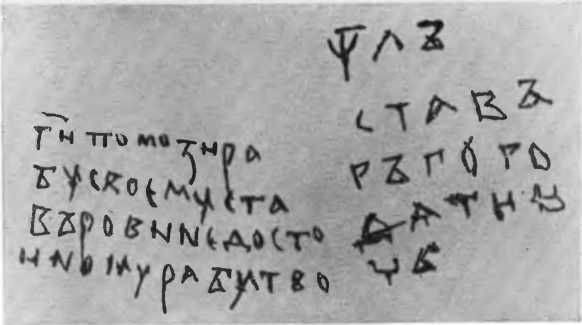
In the Nikon Chronicle it is stated that in Kiev, north of the Church of the Tithes, was the court of Stavor Gordyaty’s father.
Of course, it is impossible to say with absolute probability that in all cases we are talking about the same person. However, the Novgorod origin of this epic is not questioned by anyone.
This concludes the review of the “dark” sides of the character of the epic Prince Vladimir, just in case once again reminding us that in general it’s still quite a positive character.
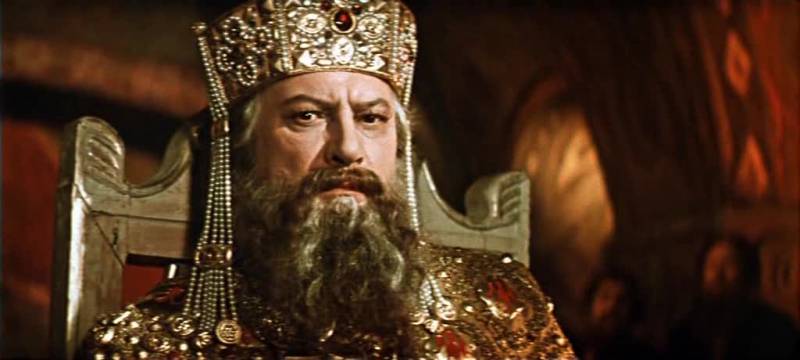
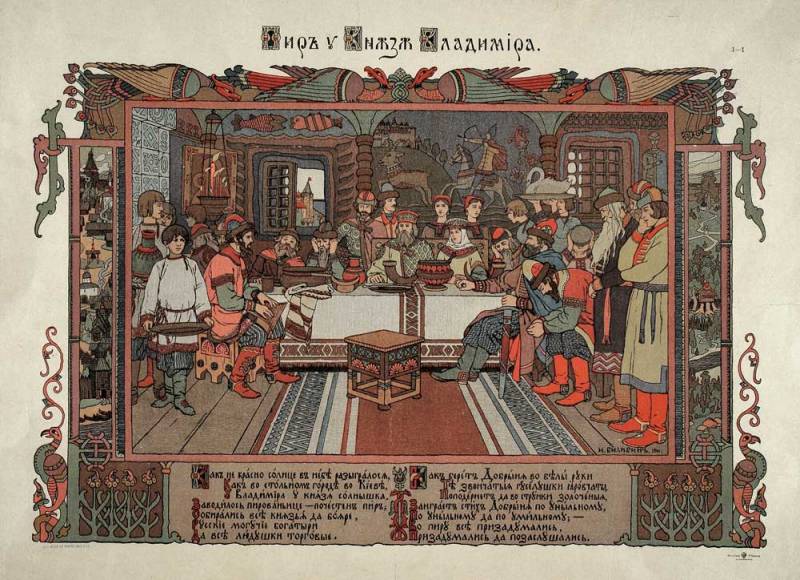
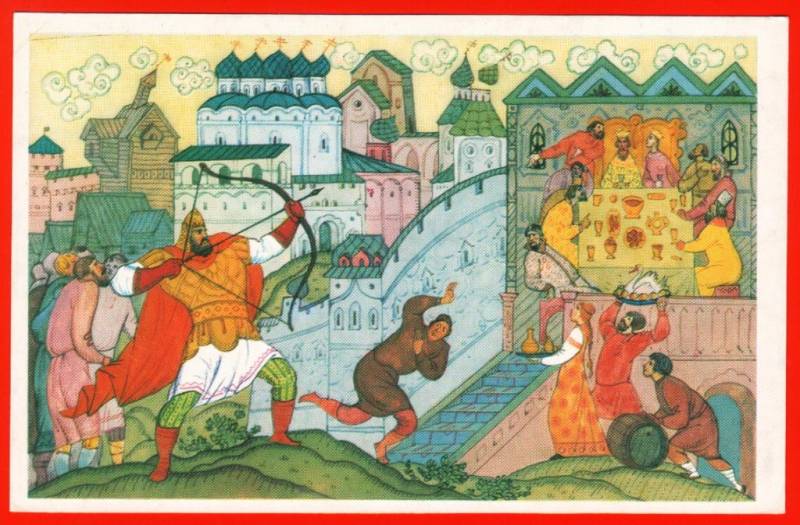
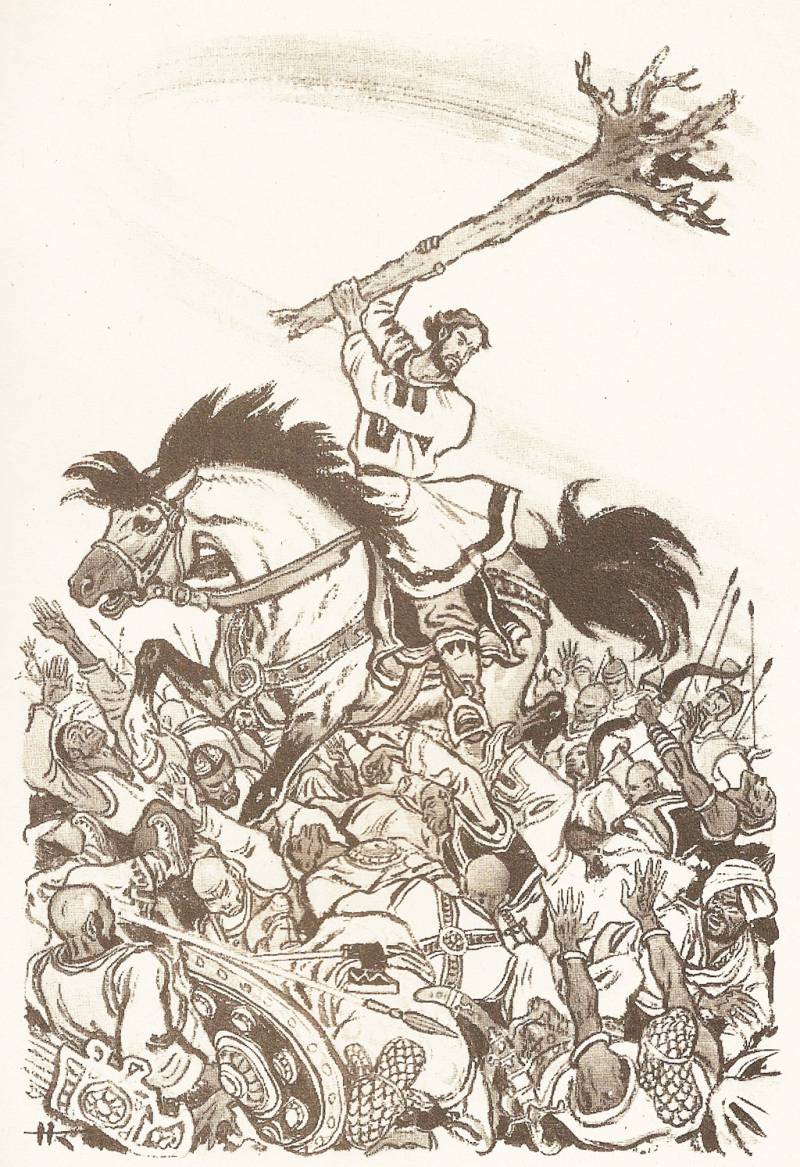
Information